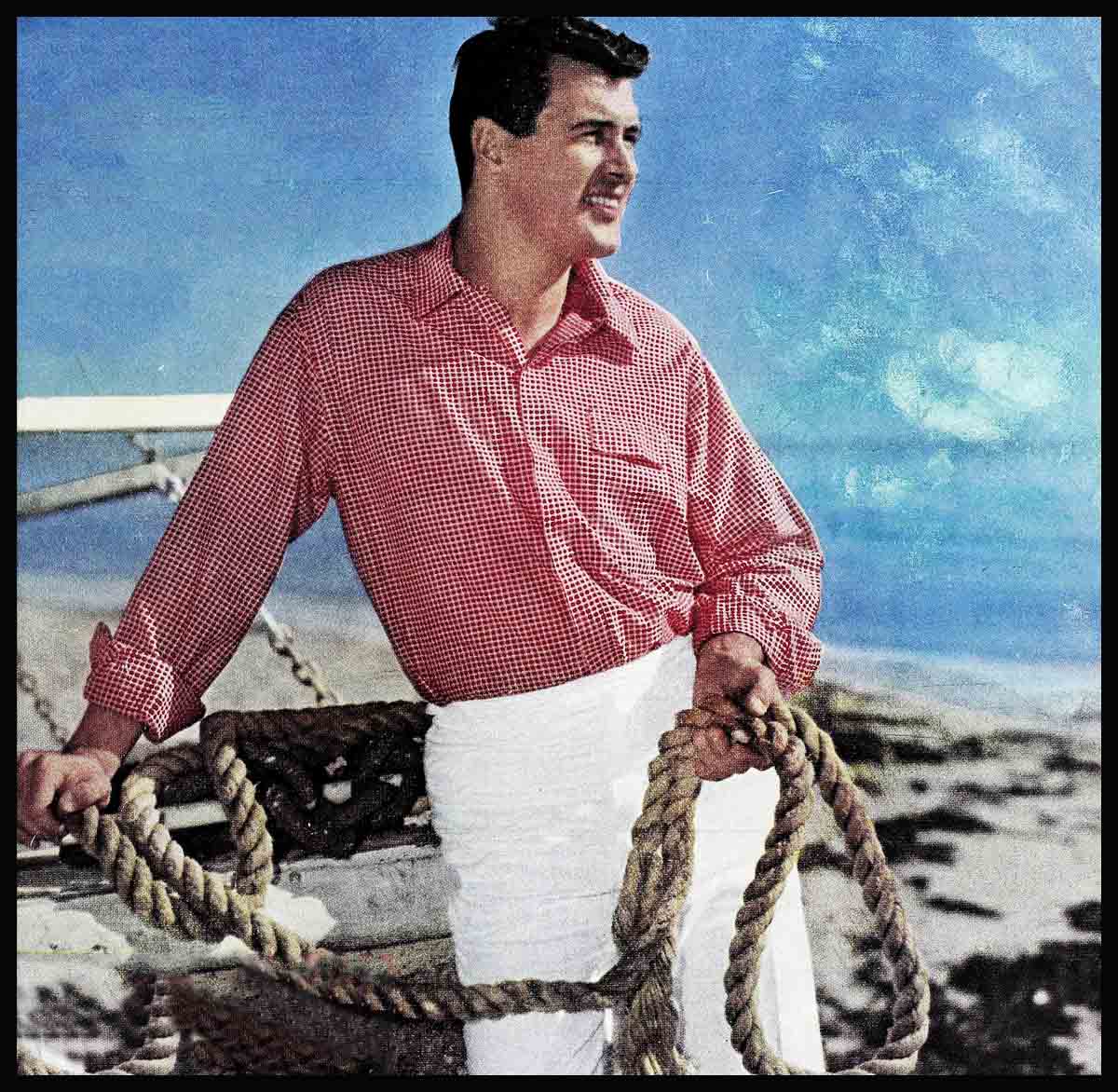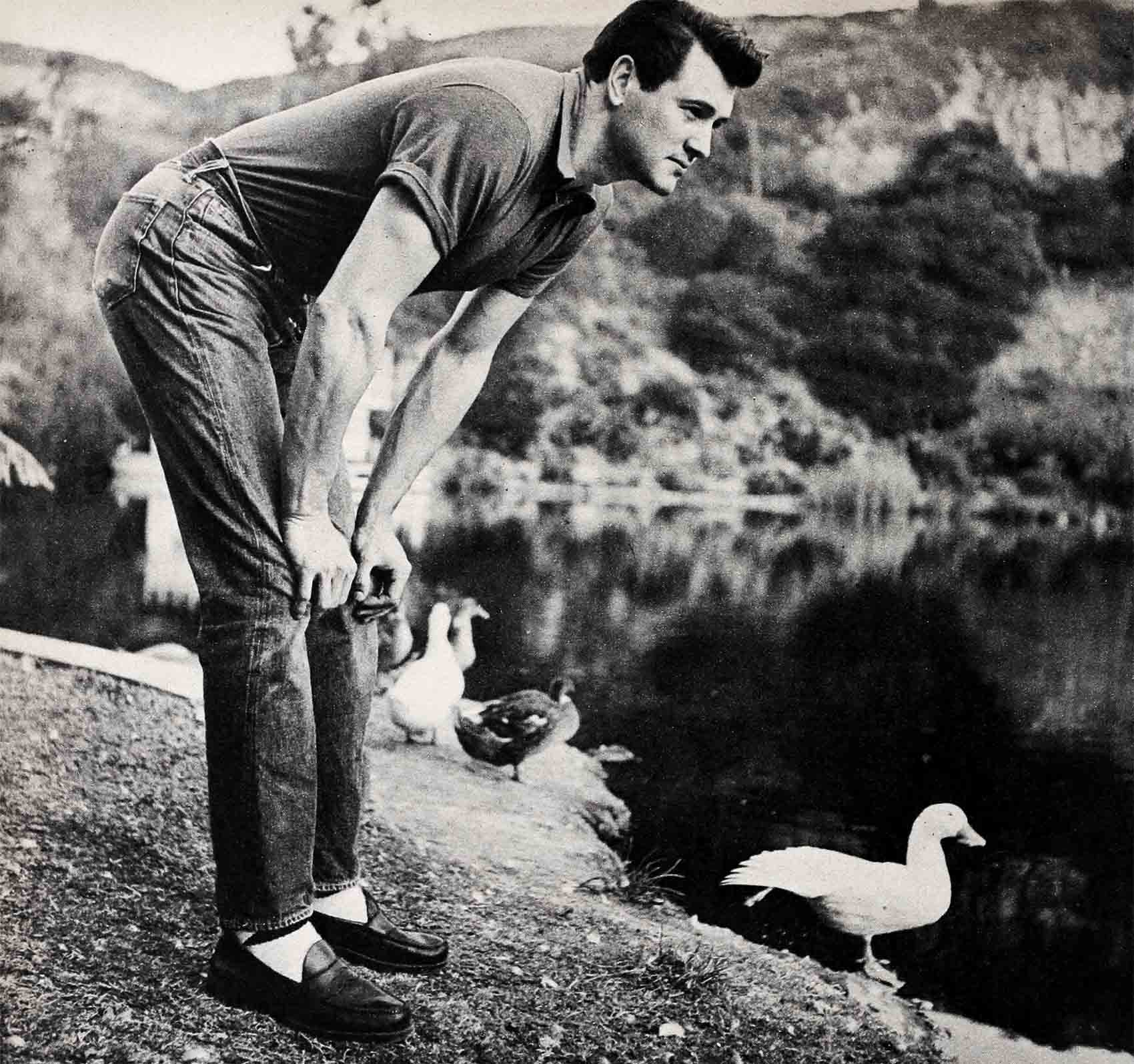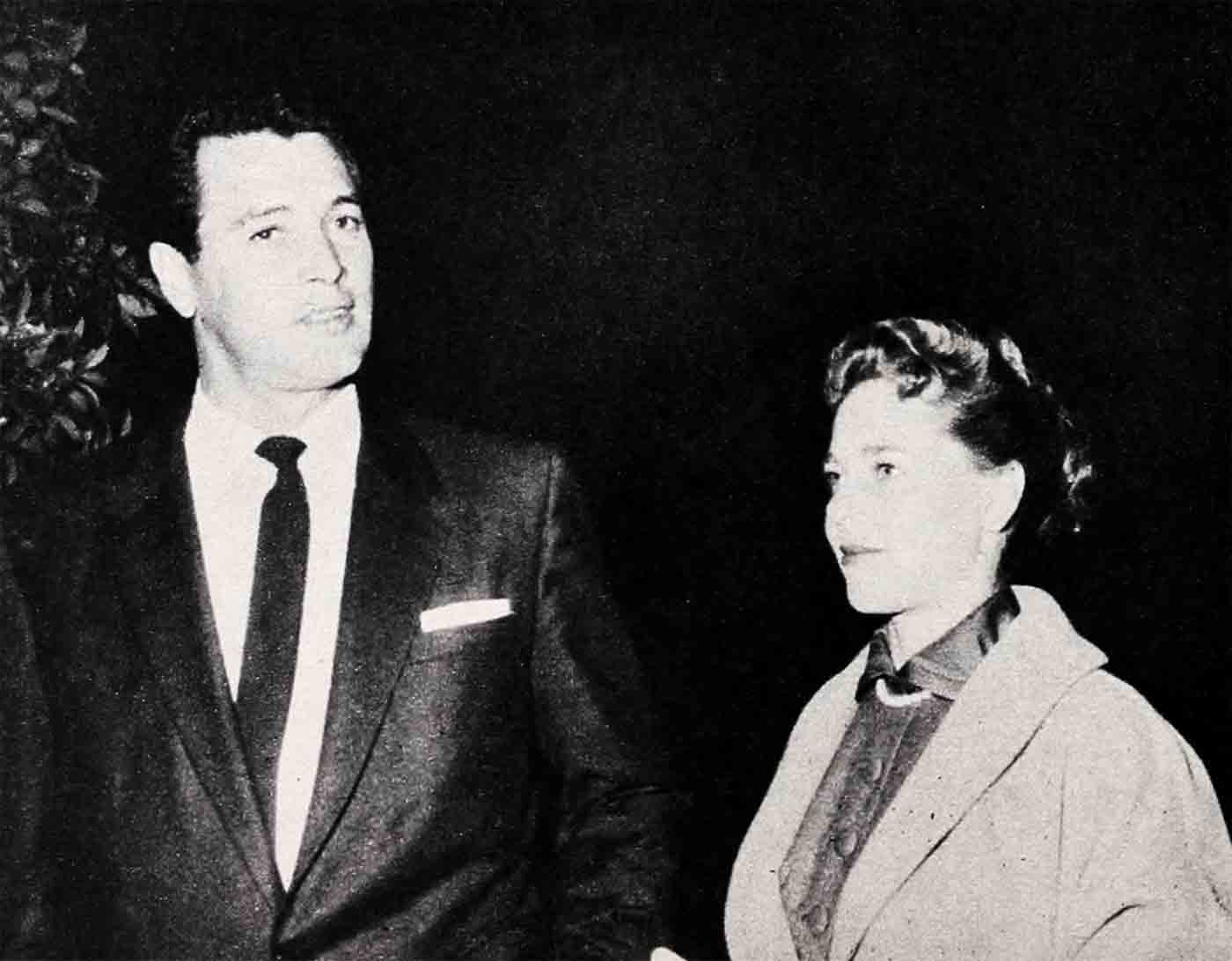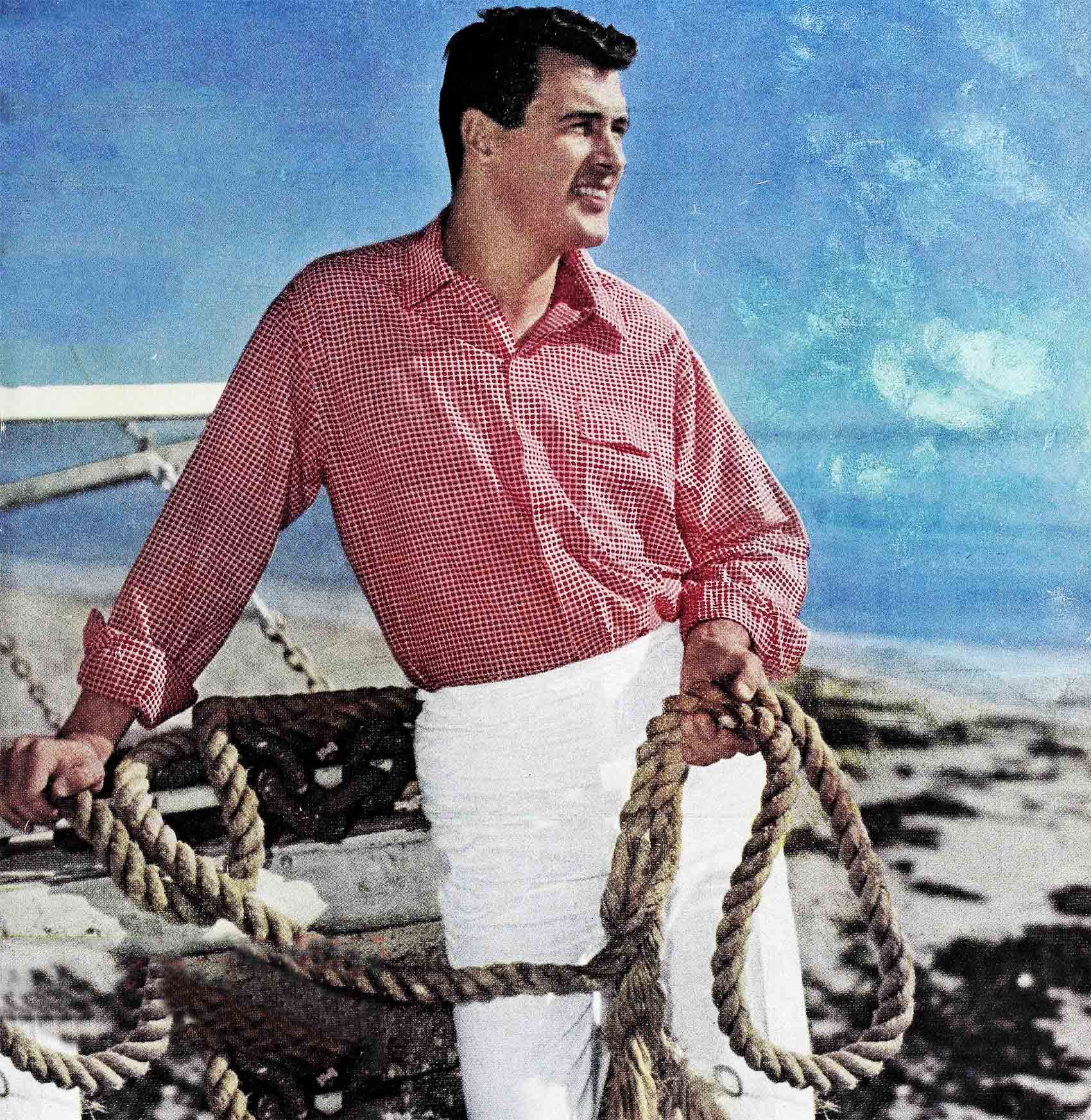
Can Rock Hudson’s Marriage Be Saved?
HER SIDE
Everything had seemed so perfect when Phyllis Gates was wed to Rock Hudson, every girl’s dream man—handsome, tall and strong, steady, faithful and honest. The kind of man who makes an ideal husband. And, with his career going into high gear, there wasn’t a single cloud in the way of the petty financial problems that beset so many newlyweds to mar their happiness. They were going to have an idyllic life, travelling to all the far-off places they wanted to see; then, after a while, settling down and children . . .
Rock’s work as a star, she knew, was complicated and demanding, something quite baffling to the uninitiated. But what girl understood the business better than she, who had been executive secretary to Rock’s agent, Henry Willson? She felt that she knew it very well. And that she knew Rock well, too. They’d dated for a year, steadily, before they married. Now, she wonders if she was not wrong, on both counts. Very wrong. And, what hurt the most, wrong about Rock.
From the beginning, even from the day they were married, things weren’t quite what she’d expected them to be. They’d had the quiet little wedding they wanted, away from the glare of Hollywood. It had been so lovely, just as she had dreamed it would be. But as soon as the news broke, it had started. They had been bombarded by the reporters, and the photographers. “Tell us, Mrs. Hudson, what’s it like to be married to America’s top heartthrob? Let’s have a big kiss, now. Just one more, please. Just one more. . . .” She knew it would happen, of course. But when it happens to you, she found, it’s different.
Rock had been wonderful. Firm and protective, just as she thought he would be. “This is my business,” he stoutly maintained. “Not my wife’s. And I believe that marriage should be a private affair.” So, all the requests for interviews with her got a polite but definite refusal from him. He knew how shy she was, how much she disliked being asked intimate questions. And the way he shielded her made her feel so happy, so cherished and secure.
But the demands were always there, pecking away at their privacy insistently. And Rock showed signs of weakening. “Only one set of home pictures,” he finally agreed. “Taken by the studio. Then they can be given out so everybody gets a fair share.” He still protected her, but some of their precious time together was sacrificed to interviews. “I can’t forget,” he’d explained to her, “that these people helped to put me where I am today. I don’t want to seem ungrateful. Besides, it’s part of a star’s job. You know that.”

But how far did it go? Too far, she thought. What annoyed her most were the times he gave in to such requests, when she knew he needed rest desperately.
It was the same with the thousand-and-one other demands a star is called on to fulfill. Press parties, premieres, personal appearances, and all the rest of it. It was like that at his work, too. He never threw his weight around, to make things a bit easier. Why couldn’t he put his foot down?
And there were his friends—so-called. She’d pictured their home as a private haven for just the two of them. But it wasn’t long before it was being invaded by all sorts of left-over pals from Rock’s bachelor days. Pals, he called them. Hangers-on, she felt. She tried to like them. Oh, she tried. But she just couldn’t help it.
There was no getting away from it—a man like Rock, who waits until he’s thirty to marry, is pretty set in his ways. She hadn’t planned to change him after marriage. She knew that was a mistake. But anyone would have thought he could adjust to a little thing like getting home for dinner on time.
She didn’t want to make a big issue of it. And he did always telephone her, to let her know he’d be late. But it happened so often. He’d stop to see some friend, “for a few minutes,” but even if it was really only that, the lovely hot dinner she’d spent hours preparing was spoiled. Somehow, it made her feel rejected, left out. Unloved. Her cooking was one thing she knew she could be proud of, and it was one thing she could do to please him, who gave her so much. When it did not. please him, she felt rejected, too.
He did give her so much. Too much. At first, it was so thrilling. Like the time when he’d taken her out to the garage, and there was the new Ford she’d wanted, all wrapped in red ribbon. And the day she came home, to find a darling gray poodle romping in the living room.
But after awhile, it made her feel uneasy. All those gifts, it was so unnecessary. And a waste of money. Often, they were so impractical. Like the time he brought her a terribly expensive, delicate organdy tablecloth. She’d taken it right back, and got five serviceable tablecloths for the price!
And somehow, she felt the fun was going out of their marriage. She wanted them to get back to the kind of quiet, simple life they both really wanted. And if Rock wasn’t going to do something about cutting down the demands made on him, she’d have to.

Acting on her own, she took a year’s lease on a house at Malibu. It was the wrong season of the year, but she didn’t think that mattered. What did matter was that Rock should have a new environment. A change from the old place, which he’d built and furnished himself with her help, would give him a new start, and—perhaps—a break with the old bachelor-type life.
She was going to see to it, too, that it was fit for the star Rock never seemed to realize he was. She called in a smart decorator to furnish the house. Maybe the atmosphere would make a subtle impression on Rock, and bolster his confidence.
Then Rock went overseas to make “A Farewell to Arms.” She’d thought this would be just what they needed. They’d get away from all the Hollywood pressure, and be alone, just the two of them, exploring Europe just as they’d planned it so many times. But it was not to be. She’d become ill, so terribly ill, with hepatitis. And their plans . . .
It was strange, now, to look back upon those weeks of pain as some of the happiest she’d ever spent. For, in Rock’s tender concern, his daily phone calls, his telegrams and long letters, she felt that he was closer and dearer than ever.
“Please don’t allow reporters at the airport,” she’d begged Rock’s studio, when he was due to arrive home. “When I see him, I know I’ll break down and cry.”
When she saw him, she was so happy. But soon, her joy turned to shock, and disappointment. Rock, she saw, had driven himself close to a point of collapse. He looked tense and drawn. He had lost twenty pounds. She could see the weariness in his tired eyes and heavy footsteps.
Why, oh why, couldn’t he ever learn not to let others take advantage of him? Vainly, she begged him to postpone going to Hawaii for “Twilight for the Gods.” But he’d just smile and say, “It’ll be good for us, Phyl. You need to rest in the sunshine and get back your health.”
She went to Hawaii, as he had asked. Maybe it was the pressures of his work that left them few precious moments to be alone, maybe they were tired. But somehow, there, it seemed ever harder for her to make him understand that all she wanted was him, the wonderful Rock she’d married.
HIS SIDE
“Phyllis is a wonderful girl,” Rock Hudson would say, when people asked him about his wife. “She’s warm, and kind—well, wonderful. You know.” He never was much of a man with words. And some things, he felt, were too personal to be paraded for everyone to see.
Phyllis. She was everything he’d been looking for in a wife, for so long. She wasn’t like the Hollywood glamour girls. Not that he had anything against glamour girls. But he didn’t want to marry a career girl. Maybe he was old-fashioned, but he believed that a woman’s place was in the home, making her husband happy and raising his kids.
That was what Phyllis wanted, and it suited him fine. It was so great, after his long, empty bachelor life, to come to the house he’d built as the fulfillment of all his dreams, to find a light in the window, and Phyllis there to greet him, with a hot dinner ready.
How nice it was to have a wife who attended to all the worrisome details he never could cope with—like remembering to send his suits to the cleaners, and sending thank-you notes. He’d always been careless about such things. He was a miserable correspondent. But Phyllis was a wonder. She took care of everything.
Funny, though, how a girl as efficient as Phyllis could get upset by some of the simple things that he’d always taken for granted. He couldn’t help but feel a little worried, after they were married, to discover that she often seemed to resent times apart. He’d been so sure she’d understand. Interviews, for instance. He felt they were both right in trying to have some privacy—but she didn’t even seem to feel that a person should devote extra time to such things. He tried to explain, but it did no good. But then, even Phyllis couldn’t know how tough it was before he became a star, and how grateful he was. And scared.
Sure, he was scared. He knew how easy it was to lose stardom, once you had it. “You’re only as good as your last picture,” they said, and it was true. He had to work, and work hard, to hang onto what he had. And that meant not only in front of the cameras, but all the extra demands that are made of a star.
As time passed, he couldn’t help but feel a little concern at Phyllis’ retiring withdrawal from the spotlight, and her attitude that he should cut down to spend more time at home. Maybe he expected too much of her, but he was kind of hoping that she’d want to join in.

He never could feel at ease with strangers, no matter how much he was exposed to them. He was shy, there was no doubt about that. He admitted it. Phyllis was fine those times when they had to go out. She was gracious and charming, and everybody loved her. But he could never convince her of that. The truth was, she was even more shy than he. He had learned to try to overcome it. If she’d only try, too, and make more effort to help him meet, what to him, were the more ordinary business obligations, their life could be so much easier and happier. But it was hard.
That didn’t really matter, though. He’d manage, somehow. He always had. What did matter was that they have a happy home life together. And there, for some reason he couldn’t understand, he wasn’t doing so well.
He’d been so happy, after they married, to bring her gifts. That was one of the big pleasures he got out of being a star. He knew he was like a big kid about it—he loved to make everything a surprise. It was such fun to see her face light up when he brought her something the practical Phyllis wouldn’t dream of buying for herself. He’d been so disappointed, when news of a mink stole he bought for her leaked out in a column before he could surprise her with it. But she’d been just as pleased.
After the first few times, though, he noticed a difference in Phyllis. The time he’d bought that fancy tablecloth, and she returned it for five others. Sure, it was the sensible thing to do. He ought to be proud and thankful to have a wife like that. But after that, even though she acted just as thrilled about his gifts, he read in her eyes—or thought he read—a look that said, “Oh, what did you do that for? Such a waste of money!” And the fun went out of it.
Why, then, did she do a thing like taking that house at Malibu, without asking him? The lease was stiff, and the decorating cost a pretty penny. And it was a resort place where you could live only part of the year. It was too much.
It wasn’t so much the cost that bothered him—certainly, with what he was making, they could well afford it. What got him was that they’d put so much effort into the home they had. It was like throwing it away, all it had meant to them. Throwing away the simple kind of life, too. “Going Hollywood.” Was that what Phyllis wanted? He doubted it.
It just wasn’t like Phyllis. But maybe she had some other reason. Maybe this was another move to make him give up his old friends from his bachelor days. Sure, Phyl was right about some of them, he had to agree. He probably should have given them the gentle heave-ho a long time ago. But now? They’d probably go around reporting, “Rock Hudson’s got a big head.” Anyway, he just couldn’t bring himself to do it.
And a guy needed to have men pals, a guy who liked to hunt and fish and sail, like he did. He and Phyllis had it all worked out, from the start, very sensibly, they thought. After all, somehow, he pictured the idea of Phyllis casting a fishing rod as just as fantastic as the picture of him balancing a teacup.
But all the petty little annoyances they’d bickered about faded into nothing when he went to Italy, and she became sick while he was there. Gosh, how he missed her! How many times, after a long, hard day’s work, he’d lain awake, tense with worry about her. It was hard on him, too, he knew. It’s pretty tough to be separated from your wife for such a long time. So darned lonely. He got edgy and irritable.
He promised himself that when he got home, things would be different. But he couldn’t shake off the tension. He tried to tell himself that, after all, he was run down, and it would pass. But when people—including Phyl—looked at him in that pitying way, he got riled. And when Phyl tried to talk him into stalling on “Twilight for the Gods,” he blew his top. What—hold up a whole production, just because he was a little under par? He tried to hide his feelings from her—and after all, that Hawaiian sunshine was just what a Maybe it would help them both.
It didn’t. Somehow, the tensions had kept on building up, and when they came back they exploded. He moved out. They’d have a better chance to think things over, apart.
Then he called Phyllis, and asked her to go to the Mocambo one Saturday night. It was their second wedding anniversary. She was great, the same wonderful girl he married. They had a grand, real fun time.
But under the surface, the problems were still there, he knew. Would Phyllis ever be able to adapt to the things about his life he couldn’t change? Would she ever give him the kind of helping hand he needed? It was a large order, to ask a wife to be a sweet homebody and help in your business, too. Or was it? Rock Hudson wondered.
Analysis:
What a pity that the lives of these two young people should be blighted by problems that, due to circumstances beyond their control, got out of hand!
“They’re so much alike,” people said approvingly when Rock and Phyllis married. But basically, it was that very similarity of temperament that was at the root of their troubles. Phyllis’ shyness, when exposed to the pitiless spotlight of Rock’s stardom, might not have mattered—except that Rock, equally retiring, was not the man to help her overcome it. Nor was Phyllis the type of woman who, without a qualm, can step in and ease the way for a shy husband. So they floundered, and suffered, together.
Clearly, both need to face this situation squarely, if marriage is to have a second chance. For both of them, it means making an effort. Rock, who has already gone a long way in conquering his personal insecurity, as those who remember the blushing, bumbling young man of a few years ago well know, should take the initiative in this. Perhaps, from his own experience, he can convince Phyllis that shyness really can be overcome, though it takes time—and trying.
On her part, Phyllis should realize that Rock is too easy-going and modest a person to cope with the pressures of his career alone. If she can accept this fact—if she can know, as so many Hollywoodites do, that Rock is simply not the kind of person who will ever realize that he is a powerful star who has a right to say no—then, like the very sensible person she is, she will go about changing it. She has been right, of course, in thinking that Rock’s business is his own—but only to a point. As many a smart wife has learned, there are many little ways in which a wife can help her husband’s career and relieve the pressures. Too, there are many situations where Rock, out of loyalty or gratitude to those who have helped him up the rough road to stardom, feels that he cannot refuse—and he won’t even if it endangers his health. Then, clearly, it’s up to Phyllis to take a stand, if their relationship is not to suffer.
Rock must realize, too, that even though clinging to some of his old bachelor habits may seem insignificant to him, it isn’t. A certain amount of flexibility and adjustment of both partners is necessary to reach a happy medium. Come now, Rock—mightn’t it have been just as easy to make those appointments of yours afterdinner? Of course, this is a little thing— but a lot of little things can wear away a marriage as drops of water on stone.
In the matter of expenditures, surely a happy solution could be reached. It’s understandable that Rock should be disappointed and hurt at Phyllis’ seeming rejection of his gifts. But couldn’t he, by a little conspiracy with her friends, or some leading questions, find out what would really delight her beforehand?
Phyllis’ choice of the house at Malibu was a mistake, although she had the best intentions in the world. A change of scenery is never enough to change inner thoughts and attitudes.
It must be kept in mind that both Rock and Phyllis—discounting the time they were apart due to his work and her illness—had really only been through the first, hardest year of matrimony. And, just at the time they had completed it, they were both thrown against a physical crisis that was totally unexpected—her serious illness with hepatitis, his nervous exhaustion due to overwork.
It’s sad to reflect that, if this had not happened, their problems might not have reached the breaking point. Now, with Rock eager to leave again for Italy, it appears that they have accepted the fact that their differences are too great to overcome.
Differences they have, very serious ones. But if they can only understand that those differences arose because of the thing that most attracted them—the similarity of character that, in many ways, made their relationship rare and wonderful—then they can, by working together and sharing as they never have before, save their marriage.
THE END
It is a quote. PHOTOPLAY MAGAZINE FEBRUARY 1958




